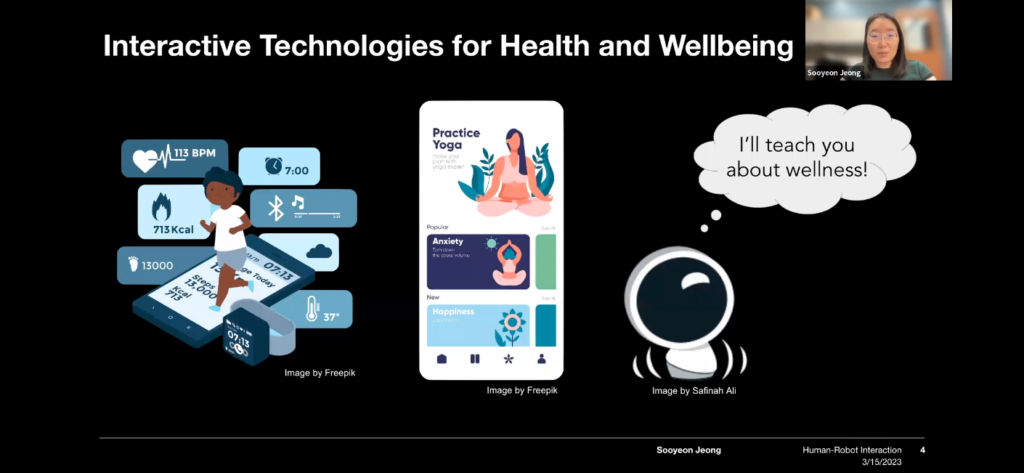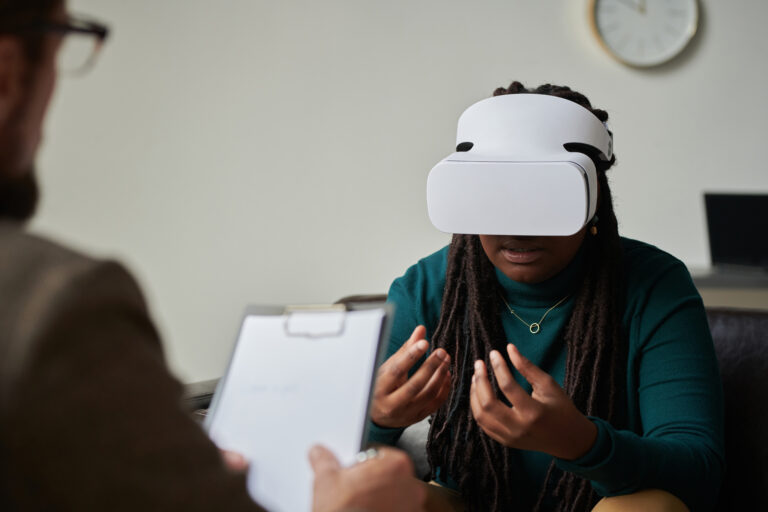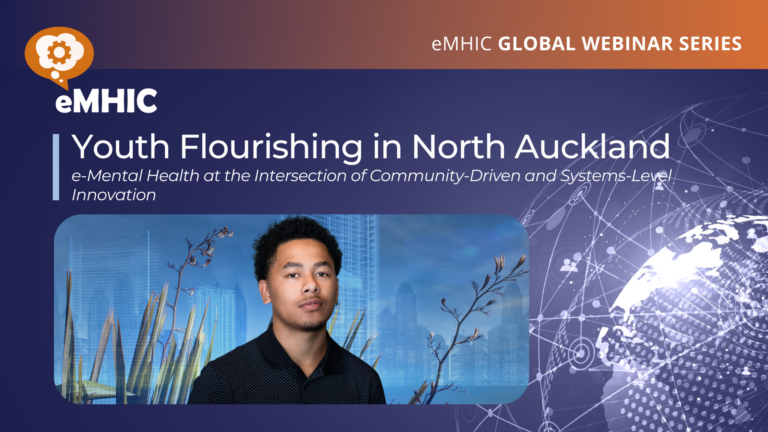Abstract
Social support plays a crucial role in managing and enhancing one’s mental health and well-being. In order to explore the role of a robot’s companion-like behavior on its therapeutic interventions, we conducted an eight-week-long deployment study with seventy participants to compare the impact of (1) acontrol robot with only assistant-like skills, (2) acoach-like robot with additional instructive positive psychology interventions, and (3) acompanion-like robot that delivered the same interventions in a peer-like and supportive manner.
The companion-like robot was shown to be the most effective in building a positive therapeutic alliance with people, enhancing participants’ well-being and readiness for change. Our work offers valuable insights into how companion AI agents could further enhance the efficacy of the mental health interventions by strengthening their therapeutic alliance with people for long-term mental health support.

References
- Hojjat Abdollahi, Ali Mollahosseini, Josh T Lane, and Mohammad H Mahoor. 2017. A pilot study on using an intelligent life-like robot as a companion for elderly individuals with dementia and depression. In 2017 IEEE-RAS 17th International Conference on Humanoid Robotics (Humanoids). IEEE, 541–546.
- Alaa Althubaiti. 2016. Information bias in health research: definition, pitfalls, and adjustment methods. Journal of multidisciplinary healthcare, Vol. 9, 211.
- Irwin Altman and Dalmas A Taylor. 1973. Social penetration: The development of interpersonal relationships. Holt, Rinehart & Winston.
- William Todd Anderson. 2012. Mindful listening instruction: Does it make a difference. Contributions to Music Education, 13–30.
- Laura Aymerich-Franch and Iliana Ferrer. 2022a. Investigating the use of speech-based conversational agents for life coaching. International Journal of Human-Computer Studies , Vol. 159, 102745.
- Laura Aymerich-Franch and Iliana Ferrer. 2022b. Liaison, safeguard, and well-being: Analyzing the role of social robots during the COVID-19 pandemic. Technology in Society, 101993.
- Thomas C Bailey, Winnie Eng, Michael B Frisch, and CR Snyder. 2007. Hope and optimism as related to life satisfaction. The Journal of Positive Psychology , Vol. 2, 3, 168–175.
- Elin A Björling, Honson Ling, Simran Bhatia, and Kimberly Dziubinski. 2020. The Experience and Effect of Adolescent to Robot Stress Disclosure: A Mixed-Methods Exploration. In International Conference on Social Robotics. Springer, 604–615.
- Linda Bolier, Merel Haverman, Gerben J Westerhof, Heleen Riper, Filip Smit, and Ernst Bohlmeijer. 2013. Positive psychology interventions: A meta-analysis of randomized controlled studies. BMC public health, Vol. 13, 1, 1–20.
- Céline Braunwalder, Rachel Müller, Marija Glisic, and Christine Fekete. 2022. Are positive psychology interventions efficacious in chronic pain treatment? A systematic review and meta-analysis of randomized controlled trials. Pain medicine, Vol. 23, 1, 122–136.
- Fred B Bryant and Joseph Veroff. 2017. Savoring: A new model of positive experience. Psychology Press.
- Amanda Carpenter and Kathryn Greene. 2015. Social penetration theory. The international encyclopedia of interpersonal communication, 1–4.
- Tanya L Chartrand and Rick Van Baaren. 2009. Human mimicry. Advances in experimental social psychology , Vol. 41, 219–274.Google Scholar
- Sheldon Cohen and Thomas A Wills. 1985. Stress, social support, and the buffering hypothesis. Psychological bulletin , Vol. 98, 2, 310.
- Paul C Cozby. 1972. Self-disclosure, reciprocity and liking. Sociometry, 151–160.
- M Brent Donnellan, Frederick L Oswald, Brendan M Baird, and Richard E Lucas. 2006. The mini-IPIP scales: Tiny-yet-effective measures of the Big Five factors of personality. Psychological assessment , Vol. 18, 2, 192.
- Robert A Emmons and Charles M Shelton. 2002. Gratitude and the science of positive psychology. Handbook of positive psychology , Vol. 18, 459–471.
- Donna M Fogelson, Carolyn Rutledge, and Kathie S Zimbro. 2021. The Impact of Robotic Companion Pets on Depression and Loneliness for Older Adults with Dementia During the COVID-19 Pandemic. Journal of Holistic Nursing, 08980101211064605.
- Jairo N Fuertes, Alexa Mislowack, Jennifer Bennett, Laury Paul, Tracey C Gilbert, Gerardo Fontan, and Laura S Boylan. 2007. The physician–patient working alliance. Patient education and counseling , Vol. 66, 1, 29–36.
- Daniel C Ganster and Bart Victor. 1988. The impact of social support on mental and physical health. British Journal of Medical Psychology , Vol. 61, 1, 17–36.
- Karen Glanz, Barbara K Rimer, and Kasisomayajula Viswanath. 2008. Health behavior and health education: Theory, research, and practice. John Wiley & Sons.
- Jonathan Gratch, Gale M Lucas, Aisha Aisha King, and Louis-Philippe Morency. 2014. It’s only a computer: The impact of human-agent interaction in clinical interviews. In Proceedings of the 2014 international conference on Autonomous agents and multi-agent systems. 85–92.
- H Haker, C Lauber, and W Rössler. 2005. Internet forums: A self-help approach for individuals with schizophrenia? Acta Psychiatrica Scandinavica , Vol. 112, 6, 474–477.
- Morten Hesse. 2006. The Readiness Ruler as a measure of readiness to change poly-drug use in drug abusers. Harm reduction journal, Vol. 3, 1, 3.G
- Henry CY Ho, Dannii Y Yeung, and Sylvia YCL Kwok. 2014. Development and evaluation of the positive psychology intervention for older adults. The Journal of Positive Psychology , Vol. 9, 3, 187–197.
- Julianne Holt-Lunstad, Timothy B Smith, Mark Baker, Tyler Harris, and David Stephenson. 2015. Loneliness and social isolation as risk factors for mortality: A meta-analytic review. Perspectives on psychological science , Vol. 10, 2, 227–237.
- Julianne Holt-Lunstad, Timothy B Smith, and J Bradley Layton. 2010. Social relationships and mortality risk: A meta-analytic review. PLoS medicine, Vol. 7, 7, e1000316.
- Luke W Hyde, Adam Gorka, Stephen B Manuck, and Ahmad R Hariri. 2011. Perceived social support moderates the link between threat-related amygdala reactivity and trait anxiety. Neuropsychologia, Vol. 49, 4, 651–656.
- Sooyeon Jeong, Sharifa Alghowinem, Laura Aymerich-Franch, Kika Arias, Agata Lapedriza, Rosalind Picard, Hae Won Park, and Cynthia Breazeal. 2020. A Robotic Positive Psychology Coach to Improve College Students’ Wellbeing. In 2020 29th IEEE International Conference on Robot and Human Interactive Communication (RO-MAN). IEEE, 187–194.
- Sooyeon Jeong, Laura Aymerich-Franch, Kika Arias, Sharifa Alghowinem, Agata Lapedriza, Rosalind Picard, Hae Won Park, and Cynthia Breazeal. 2022. Deploying a robotic positive psychology coach to improve college students’ psychological well-being. User Modeling and User-Adapted Interaction, 1–45.
- Deborah L Johanson, Ho Seok Ahn, Bruce A MacDonald, Byeong Kyu Ahn, JongYoon Lim, Euijun Hwang, Craig J Sutherland, and Elizabeth Broadbent. 2019. The effect of robot attentional behaviors on user perceptions and behaviors in a simulated health care interaction: Randomized controlled trial. Journal of medical Internet research , Vol. 21, 10, e13667.
- Éva Kállay and Claudia Rus. 2014. Psychometric properties of the 44-item version of Ryff’s Psychological Well-Being Scale. European Journal of Psychological Assessment.
- Berton H Kaplan, John C Cassel, and Susan Gore. 1977. Social support and health. Medical care, Vol. 15, 5, 47–58.
- Minkyung Koo, Sara B Algoe, Timothy D Wilson, and Daniel T Gilbert. 2008. It’s a wonderful life: Mentally subtracting positive events improves people’s affective states, contrary to their affective forecasts. Journal of personality and social psychology, Vol. 95, 5, 1217.
- Kurt Kroenke and Robert L Spitzer. 2002. The PHQ-9: A new depression diagnostic and severity measure.
- Catherine Penny Hinson Langford, Juanita Bowsher, Joseph P Maloney, and Patricia P Lillis. 1997. Social support: A conceptual analysis. Journal of advanced nursing , Vol. 25, 1, 95–100.
- Yi-Chieh Lee, Naomi Yamashita, Yun Huang, and Wai Fu. 2020. ” I Hear You, I Feel You”: Encouraging Deep Self-disclosure through a Chatbot. In Proceedings of the 2020 CHI conference on human factors in computing systems. 1–12.
- Iolanda Leite, Ginevra Castellano, André Pereira, Carlos Martinho, and Ana Paiva. 2012. Long-term interactions with empathic robots: Evaluating perceived support in children. In International Conference on Social Robotics. Springer, 298–307.
- Iolanda Leite, Ginevra Castellano, André Pereira, Carlos Martinho, and Ana Paiva. 2014. Empathic robots for long-term interaction. International Journal of Social Robotics , Vol. 6, 3, 329–341.
- Gale M Lucas, Albert Rizzo, Jonathan Gratch, Stefan Scherer, Giota Stratou, Jill Boberg, and Louis-Philippe Morency. 2017. Reporting mental health symptoms: breaking down barriers to care with virtual human interviewers. Frontiers in Robotics and AI , Vol. 4, 51.
- Suniya S Luthar, Emily L Lyman, and Elizabeth J Crossman. 2014. Resilience and positive psychology. In Handbook of developmental psychopathology. Springer, 125–140.
- Nikolas Martelaro, Victoria C Nneji, Wendy Ju, and Pamela Hinds. 2016. Tell me more designing HRI to encourage more trust, disclosure, and companionship. In 2016 11th ACM/IEEE International Conference on Human-Robot Interaction (HRI). IEEE, 181–188.
- Myriam Mongrain and Tracy Anselmo-Matthews. 2012. Do positive psychology exercises work? A replication of Seligman et al. (2005). Journal of clinical psychology , Vol. 68, 382–389.
- Youngme Moon. 2000. Intimate exchanges: Using computers to elicit self-disclosure from consumers. Journal of consumer research , Vol. 26, 4, 323–339.
- Thomas Munder, Fabian Wilmers, Rainer Leonhart, Hans Wolfgang Linster, and Jürgen Barth. 2010. Working Alliance Inventory-Short Revised (WAI-SR): Psychometric properties in outpatients and inpatients. Clinical Psychology & Psychotherapy: An International Journal of Theory & Practice, Vol. 17, 3, 231–239.
- David Myers and Jeffrey A Hayes. 2006. Effects of therapist general self-disclosure and countertransference disclosure on ratings of the therapist and session. Psychotherapy: Theory, Research, Practice, Training, Vol. 43, 2, 173.
- Kristin Neff and Marissa C Knox. 2016. Self-compassion. Mindfulness in positive psychology: The science of meditation and wellbeing , Vol. 37, 1–8.
- Ryan M Niemiec. 2013. VIA character strengths: Research and practice (The first 10 years). In Well-being and cultures. Springer, 11–29.
- World Health Organization et al. 2018. Mental health: strengthening our response.
- Nansook Park and Christopher Peterson. 2008. Positive psychology and character strengths: Application to strengths-based school counseling. Professional school counseling , Vol. 12, 2, 2156759X0801200214.
- Acacia C Parks and Robert Biswas-Diener. 2013. Positive interventions: Past, present and future. Mindfulness, acceptance, and positive psychology: The seven foundations of well-being, 140–165.
- Christopher Peterson. 2009. Positive psychology. Reclaiming children and youth , Vol. 18, 2, 3.
- Christopher Peterson and Martin E. P. Seligman. 2004. Character strengths and virtues a handbook and classification. American Psychological Association.
- Joanne Qina’au and Akihiko Masuda. 2020. Cultural considerations in the context of establishing rapport: A contextual behavioral view on common factors. In Handbook of Cultural Factors in Behavioral Health. Springer, 75–92.
- Tayyab Rashid. 2015. Positive psychotherapy: A strength-based approach. The Journal of Positive Psychology , Vol. 10, 25–40. https://doi.org/10.1080/17439760.2014.920411
- Carol D Ryff and Corey Lee M Keyes. 1995. The structure of psychological well-being revisited. Journal of personality and social psychology, Vol. 69, 4, 719.
- Martin EP Seligman and Mihaly Csikszentmihalyi. 2014. Positive psychology: An introduction. In Flow and the foundations of positive psychology. Springer, 279–298.
- Martin EP Seligman, Tayyab Rashid, and Acacia C Parks. 2006. Positive psychotherapy. American psychologist, Vol. 61, 8, 774.
- Martin EP Seligman, Tracy A Steen, Nansook Park, and Christopher Peterson. 2005. Positive psychology progress: Empirical validation of interventions. American psychologist, Vol. 60, 5, 410.
- Anat Shoshani and Sarit Steinmetz. 2014. Positive psychology at school: A school-based intervention to promote adolescents’ mental health and well-being. Journal of Happiness Studies , Vol. 15, 6, 1289–1311.
- ML Slevin, SE Nichols, SM Downer, P Wilson, TA Lister, S Arnott, J Maher, RL Souhami, JS Tobias, AH Goldstone, et al. 1996. Emotional support for cancer patients: What do patients really want? British journal of cancer , Vol. 74, 8, 1275–1279.
- Susan Sprecher and Stanislav Treger. 2015. The benefits of turn-taking reciprocal self-disclosure in get-acquainted interactions. Personal Relationships , Vol. 22, 3, 460–475.
- Walter Dan Stiehl, Jeff Lieberman, Cynthia Breazeal, Louis Basel, Levi Lalla, and Michael Wolf. 2005. The Design of the Huggable: A Therapeutic Robotic Companion for Relational, Affective Touch.. In AAAI Fall Symposium: Caring Machines. 91–98.
- Diana I Tamir and Jason P Mitchell. 2012. Disclosing information about the self is intrinsically rewarding. Proceedings of the National Academy of Sciences, Vol. 109, 21, 8038–8043.
- Edmund R Thompson. 2007. Development and validation of an internationally reliable short-form of the positive and negative affect schedule (PANAS). Journal of cross-cultural psychology , Vol. 38, 2, 227–242.
- Virginia P Tilden and Clarann Weinert. 1987. Social support and the chronically ill individual. The Nursing Clinics of North America , Vol. 22, 3, 613–620.
- Bert N Uchino. 2008. Social support and physical health. Yale university press.
- Bruce E Wampold. 2015. How important are the common factors in psychotherapy? An update. World Psychiatry, Vol. 14, 3, 270–277.
- Thomas Ashby Wills. 1991. Social support and interpersonal relationships. Prosocial behavior.
- Korie L Zink, Marcia Perry, Kory London, Olivia Floto, Benjamin Bassin, John Burkhardt, and Sally A Santen. 2017. ?Let me tell you about my?” Provider self-disclosure in the emergency department builds patient rapport. Western Journal of Emergency Medicine , Vol. 18, 1, 43.





